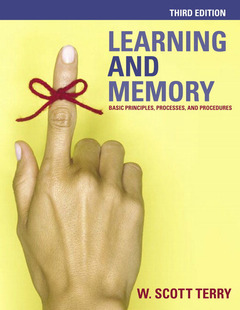Learning and memory, basic principles, processes, and procedures (3rd ed )
Langue : Anglais
Auteur : W. Terry

Preface. 1. Introduction. The Origins of the Study of Learning. Philosophy of Epistemology. Evolution. Contemporary Influences. The Definition of Learning. Some Caveats. The Learning/Performance Distinction. Learning: A Recapitulation. The Relationship between the Terms Learning and Memory. Basic and Applied Research. Common Sense and Common Knowledge. Why Animals? Conceptual Approaches to the Study of Learning. The Behavioral Approach. The Cognitive Approach. The Neuropsychological Approach. Summary. 2. Habituation and Other Forms of Simple Stimulus Learning. The Orienting Response. Habituation. Methods of Studying Habituation. Parametric Features of Habituation. Explanations of Habituation. Nonlearning Explanations. Physiological Theories. Cognitive Theories. Perceptual Learning. Other Effects of Stimulus Exposure. Preference for Familiar Stimuli. Priming Facilitation. Recapitulation: The Effects of Repeated Stimulus Presentation. Applications. Habituation to Warning Signals. Exposure Therapy for Fears. Summary. 3. Classical Conditioning. The Definition of Classical Conditioning. Methods of Studying Classical Conditioning. Some Representative Procedures. What Stimuli Can Serve as CSs? What Stimuli Can Serve as USs? Basic Phenomena of Conditioning. Acquisition. Extinction. Generalization. Discrimination. The Role of Contiguity. Other Factors Affecting Conditioning. Prior Exposure. Compound CSs. Surprise. CS—US Relevance. Conditioned Inhibition. What Is Learned in Classical Conditioning? So, What Is Learned in Pavlovian Conditioning? The Role of Awareness in Conditioning. Extensions of Conditioning. Conditioning with Drug USs and the Development of Tolerance. Modification of Immune System Response. Applications of Conditioning. The Conditioning Theory of Phobias. Systematic Desensitization. Summary. 4. Instrumental Conditioning: Reward. Definition and History. Thorndike and Trial-and-Error Learning. Skinner and Operant Learning. Methods of Study. Positive Reinforcement. Reinforcement Variables Affecting Acquisition. Amount and Quality of Reinforcement. Drive. Schedules of Reinforcement. Delay of Reinforcement. Secondary Reinforcement. Social Reinforcement. Theories of Reinforcement. Reinforcers as Stimuli. Reinforcers as Behaviors. Reinforcers as Strengtheners. Reinforcers as Information. So, What Is Reinforcement? Is Reinforcement Necessary for Learning? Conscious Awareness in Human Instrumental Learning. Criticisms of the Use of Reinforcement. Response Learning. Shaping. Limitations of Response Learning. Discriminative Stimulus Control. Generalization and Discrimination. Summary of Response Learning and Stimulus Learning. What Is Learned in Instrumental Conditioning? Response—Reinforcer Learning. Stimulus—Response Learning. Stimulus—Reinforcer Learning. What Is Learned? Stimulus—Response—Reinforcer. Applications. Habit Slips. Behavior Modification. Cognition in Animals. Summary. 5. Instrumental Conditioning: Nonreward, Punishment, and Avoidance. Defining the Contingencies: Nonreward, Punishment, and Avoidance. Nonreward. Extinction. The Partial Reinforcement Extinction Effect. Punishment. When Does Punishment Work? Unwanted Side Effects of Punishment. Punishment or Nonreward? Persistence. Avoidance Learning. Theories of Avoidance Learning. Approach—Avoidance Conflict. Approach or Avoidance as Coping Responses. Learned Helplessness. Extensions of the Learned-Helplessness Concept. Challenges to Learned-Helplessness Theory. The Significance of Learned Helplessness. Applications of Aversive-Learning Contingencies. Aversion Therapy. Treatment of Obsessive-Compulsive Disorder. Summary. 6. Verbal Learning. The Ebbinghaus Legacy. Serial Learning. Serial-Position Effect. Remote Associations. Serial Learning: An Overview. Paired-Associate Learning. Analysis of Paired-Associate Learning. Factors Affecting Paired-Associate Learning: A Summary. Free Recall. Serial-Position Effects. Rehearsal. Organization. False Recall. Organization in Animal Memory. Free-Recall Summary. Available versus Accessible Memories. Cued Recall. Recall versus Recognition versus Relearning. Recognition: Remembering vs. Knowing. Implicit Learning. Relationships among the Verbal-Learning Tasks. Application: Mnemonics. The Keyword Mnemonic. Imagery Mnemonics. Summary. 7. Human Memory: Conceptual Approaches. Partitioning Memory. Components of Memory Approach. Dual-Store Theory: Short-Term and Long-Term Memories. Divisions of Long-Term Memory: Episodic versus Semantic. Divisions of Long-Term Memory: Procedural Learning and Priming. The Organization of Long-Term Memory. Stages of Memory. Dissociating Stages. Processing Approaches. Depth of Processing. Transfer-Appropriate Processing. Connectionist Models. Modeling Person Identification. The Delta Rule. Distributed Memory. Connectionism and the Other Approaches. Applications. Repetition Priming. The Study of Abnormal Memory: Amnesia. Everyday Forgetting and the Models of Memory. Summary. 8. Short-Term Retention. Definitions. Some History. Short-Term Memory Tasks. The Brown-Peterson Distractor Task. Memory Span. Characteristics of Verbal Short-Term Retention. Acoustic Encoding. Limited Capacity. Limited Duration. Forgetting: Short-Term Memory Is Sensitive to Disruption. Transfer to Long-Term Memory. Summary of the Features of Short-Term Memory. Other Modalities of Short-Term Memory. Working Memory. Aging and Working Memory. Dementia and Working Memory. Is There Really a Separate STM? Neuropsychological Dissociations of Two-Memory Systems. Counterpoint: A Single-Store Approach? One Memory, but Multiple Traces. One Store or Several? Applications. What Is Short-Term Memory For? Comprehending and Using Language. Problem Solving. The Role of STM in Theories of Long-Term Memory. Summary. 9. Encoding. Separating Encoding from Retrieval. Some Basic Variables in Encoding. Elaborative Rehearsal. What Exactly Is Elaborative Processing? Imagery and Memory for Pictures. Meaningfulness. Presentation Variables. Serial-Position Effect. Isolation Effects and Vividness. Spacing Effects. Generation Effect. Limitations of Elaborative Processing. Learner Variables. Incidental versus Intentional Learning. Incentives. Interest. Arousal. Emotions and Encoding. Schemas. Metamemory. Applications. Academic Learning and En
Date de parution : 07-2005
Ouvrage de 480 p.
© 2024 LAVOISIER S.A.S.



